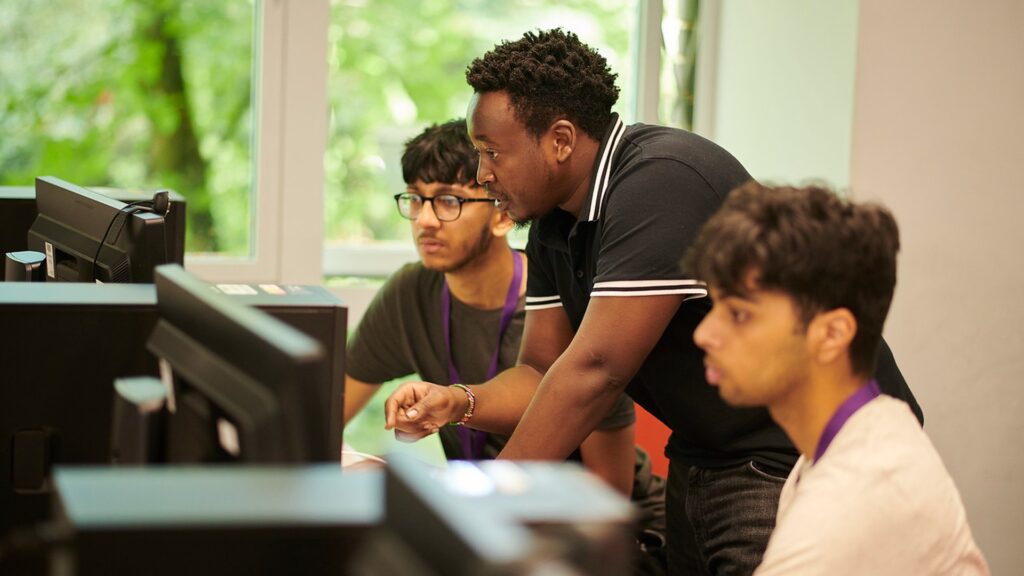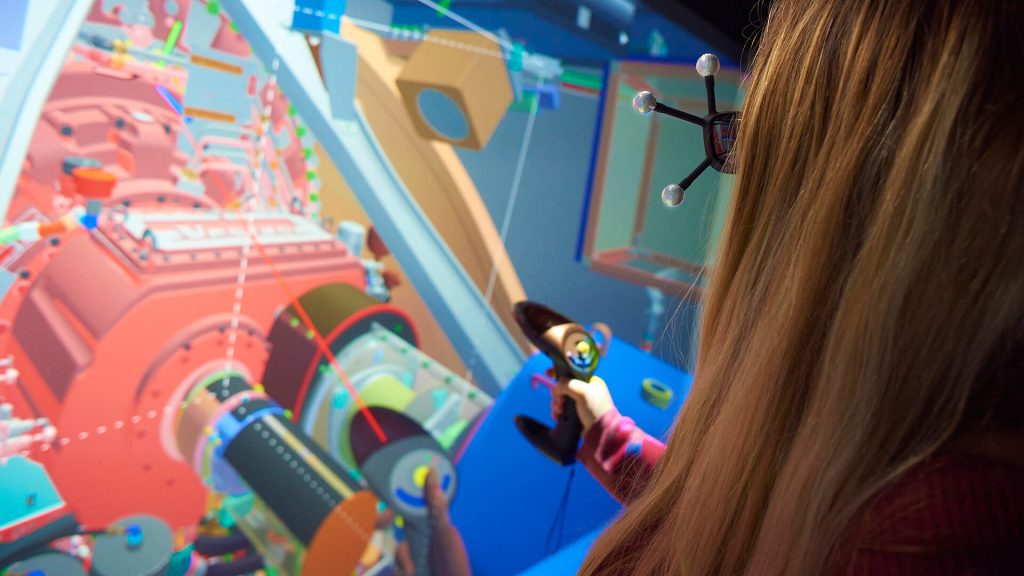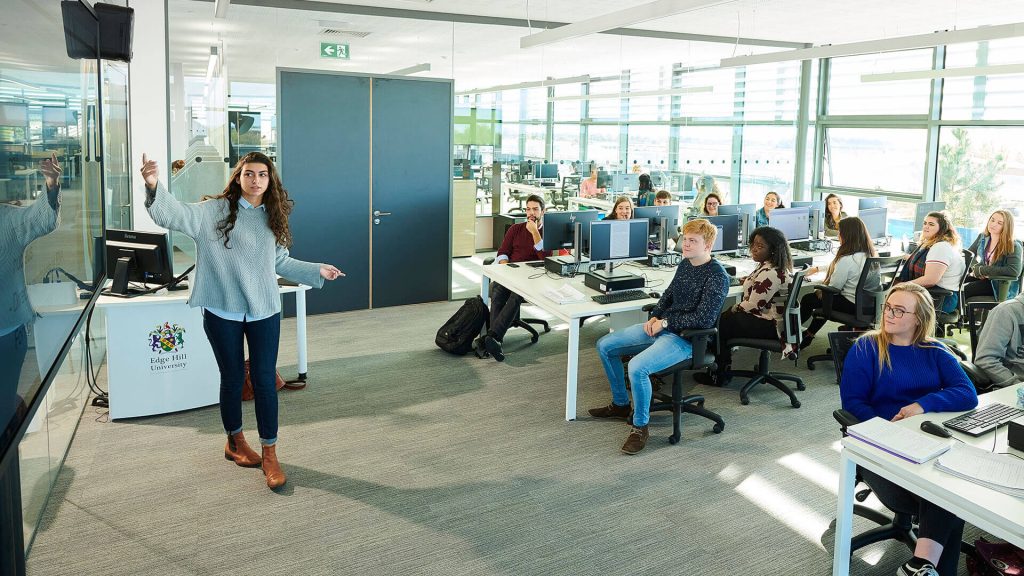Physics BSc (Hons)
UCAS code: F300
Discover advanced physics concepts and the latest developments on our physics degree. Develop your critical thinking and problem-solving skills. Gain new knowledge in areas such as nuclear physics, particle physics, and solid state physics.
Overview
| Course length: | 3 years full-time 6 years part-time |
|---|---|
| Start dates: | September 2025 |
| Location: | Edge Hill University |
| Example offers: | BBC-BBB (A Level) or DMM (BTEC) View full entry criteria |
| Subject(s): | Physics |
| Faculty: | Arts and Sciences |
| Department: | Engineering |
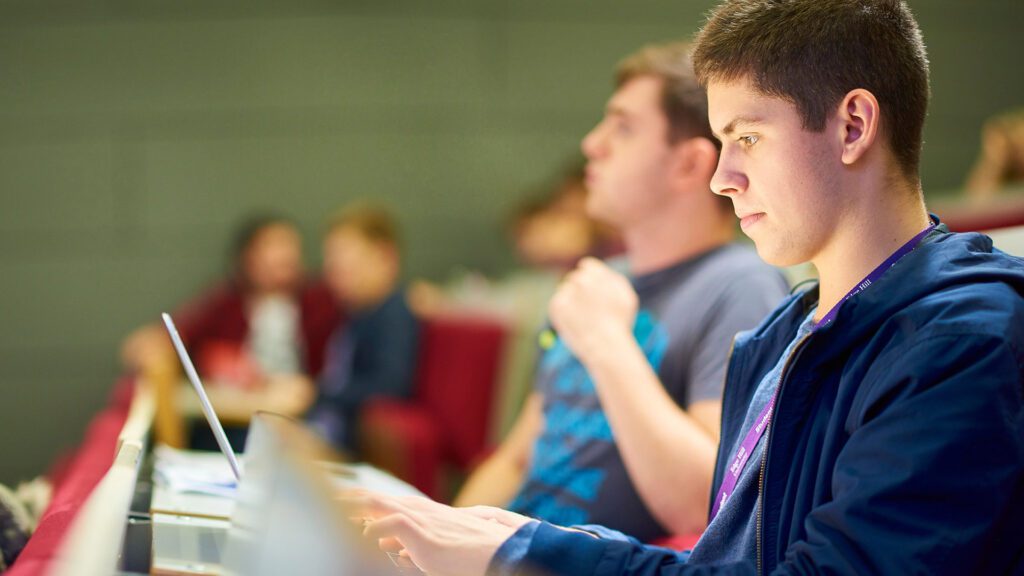
If you are captivated by the workings of the world, then a physics degree could be for you.
Enrich your natural problem solving ability through the application of mathematical models and equations, data analytics and computer programming. BSc (Hons) Physics will enhance your mathematical and science skills and provide you with the essential knowledge in a broad range of subjects including physics, engineering, and computing.
Discover advanced physics concepts, as well as developing a commercial awareness, which will prepare you for employment or further study. You will have the opportunity to work on an individual project, which will enable you to explore, in further depth a topic of your choice.
Our specialist physics and engineering teaching team are active researchers. You will learn about the latest developments while gaining the skills and knowledge required to meet industrial needs. You will develop conceptualising skills, such as planning and organisation, critical and innovative thinking, and reflective skills.
As a physics student, you will have access to state-of-the-art learning resources in our £13m Tech Hub. Our modern computing and engineering laboratories include high-specification computers, high-resolution screens and the latest hardware and software. A tensile tester machine for exploring the properties of materials, digital oscilloscopes, electrical motors, signal generators, programmable robots, wired and wireless networking hardware, and giant 3D interactive teaching screens.
Course features
-
Sandwich year option available
-
Studying abroad option available
-
International students can apply
What you'll study
In Year 1, you will study the basic skills that will provide you with a solid foundation for further study in Years 2 and 3. This will include an introduction to quantum physics and the foundations of mathematics. You will learn soft skills and gain practical knowledge through individual project work, as well as an introduction to electrical and electronics essentials and the characteristics of materials.
In Year 2, you will further develop your knowledge to an intermediate level. You will continue to progress your mathematical knowledge and will further develop your soft skills and project experience through a group project activity with others on your course. You will learn about astrophysics, as well being introduced to the world of work via a simulated work environment or project. You will gain knowledge of electromagnetism, the properties and propagation of electromagnetic waves, and the physics of antennas.
In Year 3, your knowledge will reach an advanced level. You will gain new knowledge in atomic, nuclear, solid state, statistical and particle physics. You will also develop a commercial awareness behind how a product is developed and launched to the market. You will undertake a major individual capstone project on a a chosen area of physics to conclude your studies.
How you'll study
Teaching methods are designed in consultation with leading employers in the region. The physics modules are all a mix of traditional lectures and practical sessions. you will be introduced to theoretical concepts by building on concrete practical activity. Teaching is highly interactive, with practical application of concepts a key factor, as well as cases drawn from real-life. Workshops, seminars, group tutorials and practical exercises provide opportunities for you to work with your peers and develop the essential people skills to complement your technical ability.
You will be required to attend up to four days a week.
How you'll be assessed
You will be assessed through a combination of practical exercises, reports, presentations and examinations. We want you to develop the ability to work effectively both independently and as part of a team, therefore assessment includes both forms, though the emphasis is strongly on individual work.
Who will be teaching you
You will be taught by esteemed staff who are passionate about student learning and development, as well as benefitting from guest lectures delivered by industry experts. The programme team are specialists in physics and engineering and are active researchers. Their research feeds directly into the teaching of the programme, ensuring that you will learn about the latest developments in subjects while gaining the skills and knowledge required to meet industrial needs.
Academic staff are also regular contributors to international conferences and influential journals and regularly engage with the wider business and academic environment in disseminating knowledge and delivering impact.
Entry criteria
Entry requirements
Entry requirements will be in the range 112-120 UCAS Tariff points, including A Level Mathematics and A Level Physics at Grade C or above, or equivalent. You will also need GCSE English Language at Grade C, or above, or equivalent.
Non-traditional entry is considered on merit.
Equivalent qualifications and combinations will be considered, including Extended Project (EPQ) at grade C or above. Other awards such as BTEC Extended Diploma, BTEC Nationals, International Baccalaureate and T Level, will require the equivalent point scores as the UCAS tariff.
Example offers
| Qualification | Requirement |
|---|---|
| A Level | BBC-BBB. |
| BTEC Extended Diploma (or combination of BTEC QCF qualifications) | Distinction, Merit, Merit (DMM). |
| T Level | Overall grade of Merit. |
| International Baccalaureate (IB) | We are happy to accept IB qualifications which achieve the required number of UCAS Tariff points. |
| Access to Higher Education Diploma | 45 credits at Level 3, for example 15 credits at Distinction and 30 credits at Merit or 24 credits at Distinction and 21 credits at Merit. The required total can be attained from various credit combinations. |
Please note, the above examples may differ from actual offers made. A combination of A Level and BTEC awards may also be accepted.
If you have a minimum of two A Levels (or equivalent), there is no maximum number of qualifications that we will accept UCAS points from. This includes additional qualifications such as Extended Project Qualification (EPQ), AS Levels that haven't been continued to A Level, and General Studies AS or A Level awards.
English language requirements
International students require IELTS 6.0, with a score no lower than 5.5 in each individual component, or an equivalent English language qualification.
If your current level of English is half a band, one band, or one-and-a-half bands lower, either overall or in one or two elements, you may want to consider our Pre-Sessional English course.
How to apply
Apply full-time
Read our guide to applying through UCAS to find out more about the application process.
International
Please see our international student pages for further information about how to apply as a prospective international student.
Should you accept an offer of a place to study with us and formally enrol as a student, you will be subject to the provisions of the regulations, rules, codes, conditions and policies which apply to our students. These are available at www.edgehill.ac.uk/studentterms.
If you join a full time undergraduate degree at Edge Hill University, we will guarantee you the offer of a room in our halls of residence for the first year of your course.
Discover our accommodation
Facilities
The Department of Engineering is based in the state-of-the-art £13m Tech Hub. This purpose-built development offers highly contemporary suites of outstanding facilities for Engineering and Physics, as well as Computer Science students. Our modern engineering teaching laboratories are equipped with a range of industry-standard, test and measurement equipment, and leading analytical software. 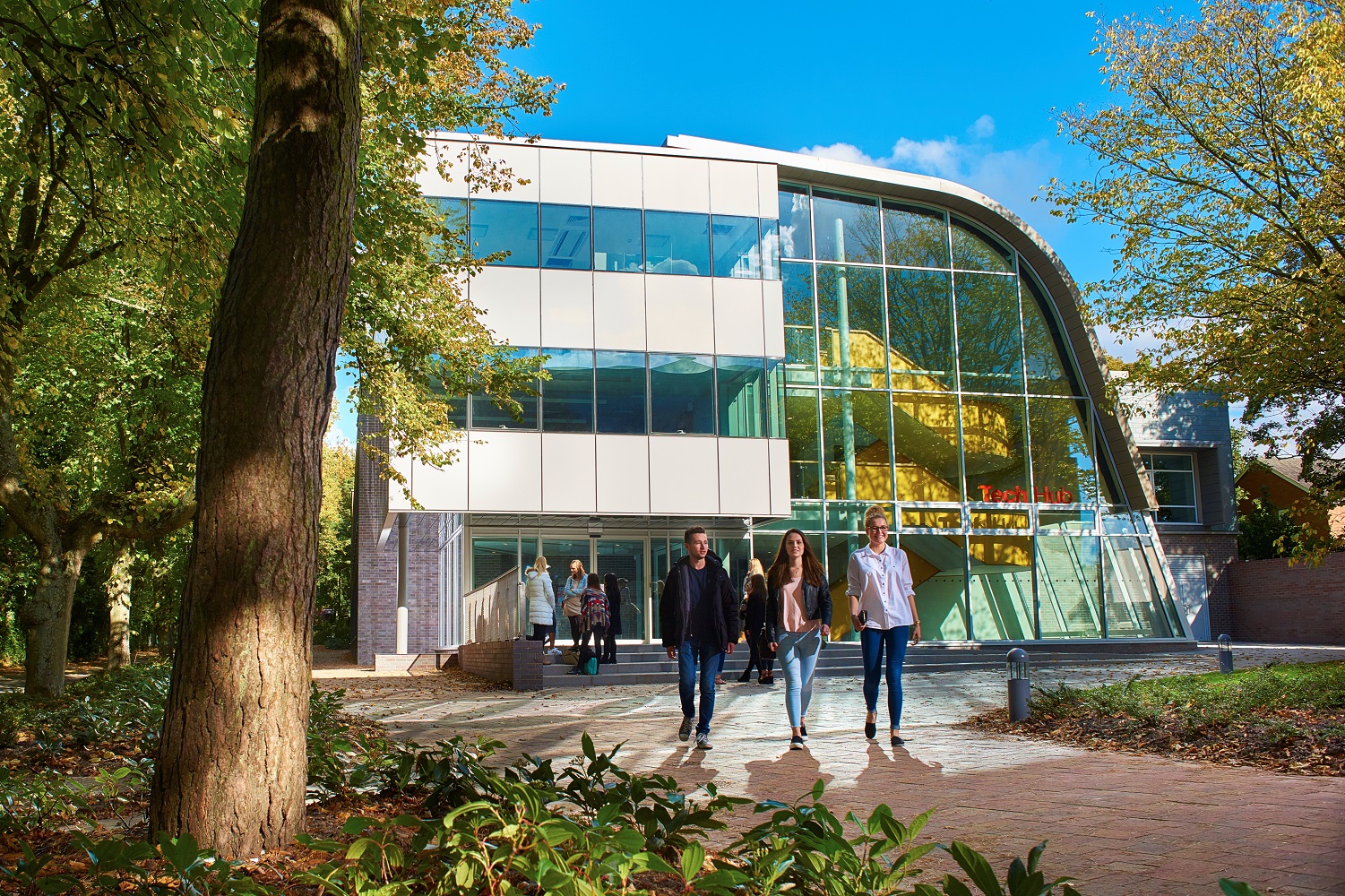
There are dedicated specialist laboratories for materials engineering, electrical motors, and electronic engineering, in addition to an abundance of computer facilities and a large, horseshoe-shaped Harvard style lecture theatre.
Where you'll study
Tech Hub
Learning resources
Learning resources include oscilloscopes, signal generators, digital multimeters, Arduino and Raspberry Pi microprocessors, a tensile tester machine, electronics training kits, single and 3-phase transformers, a 3-D printer, and robotic arm kits, plus MATLAB and SolidWorks software platforms.
Teaching and learning are supported by the web-based platform Blackboard Ultra Virtual learning Environment. The library is well-stocked with recommended print books and e-books and subscribes to high-impact technical e-Journals. The university subscribes to LinkedIn Learning, which provides free and unlimited access to thousands of high-quality online courses and video tutorials written by industry experts.
Assistive and accessible technologies include Read&Write text to speech software, Caption Ed to facilitate ease of note taking, and a mind mapping tool. The university provides specific workshops on academic skills for students who have specific learning difficulty or disability.
Finance
Tuition fees
UK Full-Time
£9,535
a year
International
£17,000
a year
2025/2026 part-time fee information will be added when available.
EU/EEA and Swiss students who have settled or pre-settled status under the EU Settlement Scheme, as well as Irish nationals, may be eligible for the UK tuition fee rate.
Financial support
Subject to eligibility, UK students joining this course can apply for a Tuition Fee Loan from the Government to cover the full cost of tuition fees. UK students enrolling on the course may also be eligible to apply for additional funding to help with living costs.
Scholarships
We offer a range of scholarships, which celebrate the determination, commitment and achievement of our students. Many of our scholarships are awarded automatically. There are some however, where you will need to be involved in an application or nomination process. To find out more about our scholarships and check your eligibility, please visit our dedicated scholarships pages.
Money Matters
Please view the relevant Money Matters guide for comprehensive information about the financial support available to eligible UK students.
EU/EEA and Swiss students who have settled or pre-settled status under the EU Settlement Scheme may be eligible to apply for financial support. Irish nationals can ordinarily apply to Student Universal Support Ireland (SUSI). If you are an EU student who does not have settled or pre-settled status, or are an international student from a non-EU country, please see our international student finance pages.
Your future career
Graduates with Physics degrees can expect to be in high demand from science, academia or industry.
A physics degree provides the technical foundation for a variety of sustainable and satisfying careers including;
- Acoustic engineer
- Accountant
- Astronomer
- Electronic engineer
- Forensic scientist
- Geophysicist
- Mechanical engineer
- Meteorologist
- Microwave engineer
- Nuclear physicist
- School teacher
- Sound engineer
- Telecommunications engineer
Course changes
Every effort has been made to ensure the accuracy of this information, however our courses are subject to ongoing review and development. Changing circumstances may necessitate alteration to, or the cancellation of, courses.
Changes may be necessary to comply with the requirements of professional bodies, revisions to subject benchmarks statements, to keep courses updated and contemporary, or as a result of student feedback. We reserve the right to make variations if we consider such action to be necessary or in the best interests of students.
